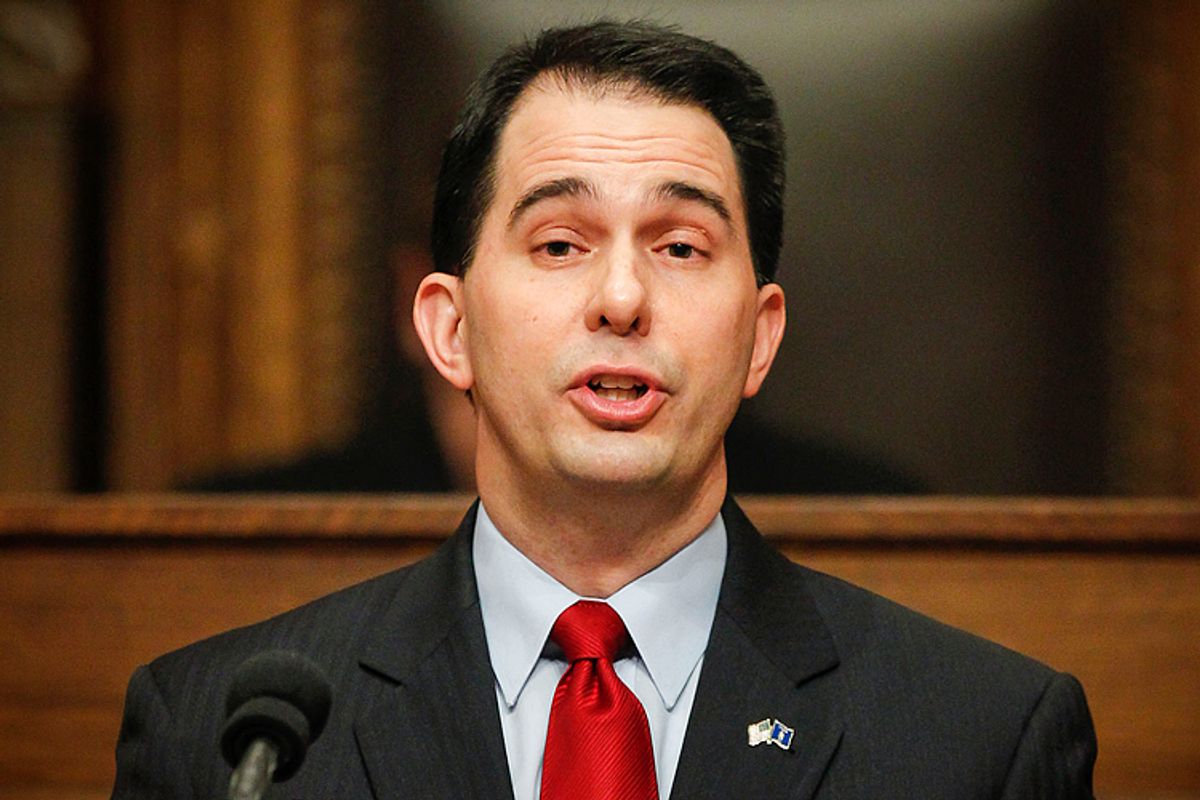Scott Walker knows just what’s wrong with the Republican Party.
Speaking with Robert Draper for a hagiographic profile in GQ, the Wisconsin governor, who’s eyeing a 2016 presidential bid but must first win a tough re-election battle against Democrat Mary Burke, identified three problems with the GOP’s national brand.
“One of the problems I see with Republicans nationally—well, three," Walker declaims, "They're always against Obama, so they're not optimistic. I try to be optimistic and visionary. Second, they talk in terms that most people can't relate to. Fiscal cliffs and sequesters don't mean anything to most people. I talk about whether your kid coming out of college is gonna have a job. And third, they don't get out much—and I'm around the state quite a bit."
In other words: there’s no need to rethink the party’s right-wing policy platform. The road to political redemption begins with enhanced public relations. Sound more optimistic! Don’t use so many wonky words! Go out there and shake some hands!
Take a page out of my playbook, Walker tells the GOP, and the party will start winning again.
“The bottom line is I was pretty committed to my ideals,” he explains to Draper, “and that's why people elected me. Not necessarily because they were ideologically in line with me, but because people have become cynical about politicians, and they want somebody who actually stands for something."
Walker – who became a national figure thanks to his Tea Party agenda, embodied most infamously by his anti-union crusade – would never be mistaken for a politician who doesn’t stand for something. But while it’s no doubt true that brazen flip-floppers like Mitt Romney and Charlie Crist – pols who seem to lack any core convictions other than that they belong in public office – have indeed contributed to cynicism about politics, the cynicism inherent in Walker’s statement is no less flagrant.
It takes a confirmed cynic to make the case that what a politician believes matters less than the fact that he or she believes something. Elections, in theory, are contests over policy agendas. Any sentient observer could tell you elections don’t always play out that way – that personality, phony controversies, and other inanities often receive more attention than the policy differences between candidates. And the Walker view that candidates are as much products to be sold as agents of particular agendas reflects the same outlook that has debased our electoral process.
To be fair, Walker makes clear that he thinks campaigns should be run on big themes. Criticizing Romney’s 2012 campaign, he suggests that if Romney had shown “how [he’d] be different,” he might be president today:
[The Romney campaign] made the huge mistake of thinking that the 1980 Reagan campaign was based on the premise of that great question, 'Are you better off than you were four years ago?' What they failed to realize is that that wasn't his argument—it was his closing argument. The larger argument was smaller government, lower taxes, more freedom. And that way people could see not only that life was miserable under Jimmy Carter but that life would be better under Ronald Reagan. Often as Republicans we tend to do this—we get what's wrong about Barack Obama. And Americans know it, too; you didn't need to beat it in. You needed to show how you'd be different.
But is this really any better? What, concretely, does Walker mean by “smaller government, lower taxes, more freedom”? Such meaningless sloganeering tells us nothing about which government programs Walker wants to cut or which taxes he wants to slash and by how much. This lack of specifics matters, as Wisconsin knows full well; even though Walker immediately moved to strip public employees of their right to collectively bargain immediately upon taking office, he never mentioned such plans during his 2010 campaign.
Do give Walker credit, though, for his bold and courageous stance in favor of “more freedom.”
That freedom, of course, doesn’t apply to women who want to control their own reproductive health or gay people who want to get married. But, echoing Walker, his friend RNC Chairman Reince Priebus tells Draper that what ultimately matters isn’t so much what Walker believes as that he has beliefs and is “likable and relatable.”
“I mean, a candidate has to be really likable and relatable,” Priebus says. “And Scott has that going for him in a big-time way. On same-sex marriage, I think it's more of how you say it than what you say. I think Scott understands how to talk and express himself in a way that doesn't compromise his principles but allows himself to exercise dignity and grace."
Ah, yes – there’s nothing quite as refreshing as a politician who opposes civil rights, but does so with “dignity and grace.”
Walker’s shtick – presenting himself as a truth-telling, principled anti-politician, even as he obfuscates and engages in cynical posturing – is painfully transparent. But Draper has fallen for it. His profile of Walker could hardly be more fawning; he describes the governor appearing on stage with the air of “a beauty pageant contestant,” marvels at how Walker refused to “cower… behind his office door” during the 2011 protests over his union-busting bill, and derides the progressives who have made Walker an “arch-villain.” Even though recently unearthed emails link Walker to efforts to raise money for allied groups like the Koch-backed Club for Growth – efforts that could constitute improper coordination – Draper dismisses the latest evidence in the case as insignificant, despite what the “Walker haters” say.
This is not the stuff of which hard-hitting journalism is made. But even if Draper showed little interest in holding Walker accountable, he did offer an illuminating glimpse – however inadvertent – into the cynical worldview that shapes Walker’s politics.

Shares